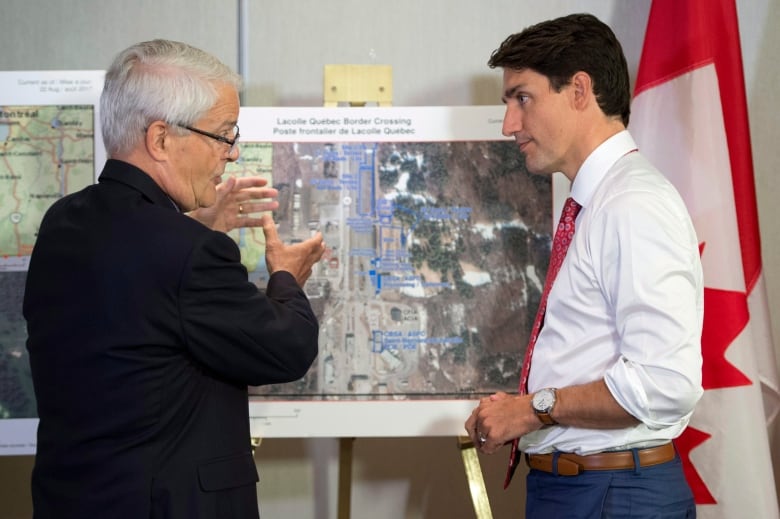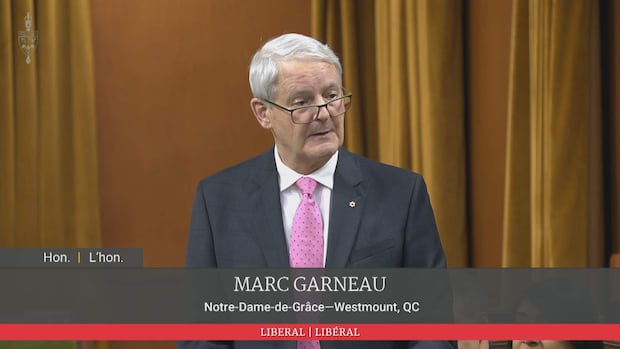
Former foreign affairs minister Marc Garneau is criticizing Prime Minister Justin Trudeau and his office, saying that he was “never sure” if something conveyed to the Prime Minister’s Office “ever got to the prime minister’s ears.”
In an interview on Rosemary Barton Live airing Sunday, he said he felt the PMO “acted as a bit of a filter,” and that certain ministers had closer access to Trudeau, like childhood friends.
“There are occasions when a minister wants to talk directly to the prime minister. And I never felt, despite the fact that he said his door was always open, that was really something that he invited,” he told CBC chief political correspondent Rosemary Barton.
Garneau served in Trudeau’s cabinet from 2015 to 2021, first as minister of transport, then as minister of foreign affairs. He was dropped from cabinet in October 2021 but remained an MP until March 2023.
His autobiography, A Most Extraordinary Ride: Space, Politics and the Pursuit of a Canadian Dream, is scheduled to be released in October by Penguin Random House. The book partly chronicles Garneau’s experience in politics.
Garneau writes that he was “surprised” to be named minister of transport, but it took little time for him to “fall in love” with the portfolio.

But in the few calls the two had with each other, Trudeau “did not seek my opinion on any issues,” Garneau writes. “Generally speaking, he was not overly interested in Transport, unless a problem surfaced.”
When Garneau was shuffled to foreign affairs — a move he describes in his book as unexpected — he writes that his new responsibilities did not bring him any closer to Trudeau.
Instead, he was only called once to offer advice at a meeting with then-ambassador to China Dominic Barton to discuss the status of Michael Kovrig and Michael Spavor, who were imprisoned in China at the time.
“The prime minister’s aloofness led me to conclude that he did not consider my advice useful enough to want to hear from me directly, relying instead on his staff,” Garneau writes. “I found this disappointing, to say the least.”
During his interview, Garneau said he still doesn’t know why he was removed from Trudeau’s cabinet.
Former cabinet minister Marc Garneau announces his resignation to the House of Commons after a 14 year career in politics.
“It was a punch in the gut. I was very disappointed,” Garneau said. “I had a whole bunch of things I wanted to do at foreign affairs, but it was not to be.”
As the Liberals continue to struggle in the polls, Garneau did not say whether Trudeau should quit as leader of the party.
Instead, he described Trudeau as “somebody who doesn’t like to give up. He likes a good fight, and I think that he’s made up his mind that he’s going to fight that fight. So we’ll see what happens.”
Canada’s place in the world ‘slipping’
Garneau also expressed concern over Canada’s international reputation and its foreign affairs strategies, saying that “we don’t always know who we are dealing with.”
“This applies primarily to the Indo-Pacific, where the centre of gravity of the world has shifted and will be there most of this century,” Garneau said. “We do not know the countries there as well as we need to know them.”
The second shortcoming for Canada, Garneau said, is that “we want to be a voice that’s heard in the world, and yet we don’t have the credibility to match those words.”
“We want to do our share of the heavy lifting with respect to collective security, but we’re unable to do it because we have neglected our armed forces for too many decades.”
After a litany of criticism from allies, especially the United States, the Liberal government announced in early July that it hopes to meet NATO’s military spending benchmark of 2 per cent of members’ gross domestic product by 2032.
But Garneau referenced other examples that suggest Canada’s reputation is waning, like its failed bid to join the United Nations Security Council in 2020, or how “nobody came to see us” about new multinational partnerships such as AUKUS or the Quad.
“We are slipping, from that point of view. And if that’s the way it’s going to be, then we make that decision, we accept it,” Garneau said. “But we shouldn’t be expected to be taken as seriously as we’d like to be.”
